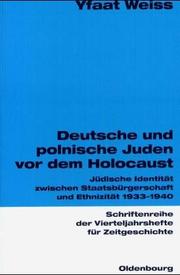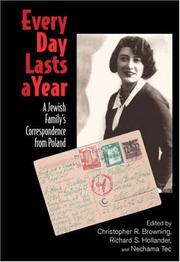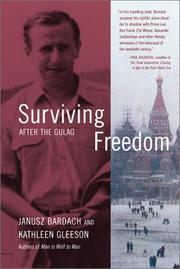| Listing 1 - 10 of 13 | << page >> |
Sort by
|

ISBN: 3486645811 3486702955 Year: 2000 Publisher: De Gruyter
Abstract | Keywords | Export | Availability | Bookmark
 Loading...
Loading...Choose an application
- Reference Manager
- EndNote
- RefWorks (Direct export to RefWorks)
Noch im ersten Drittel des 20. Jahrhunderts unterschied sich das assimilierte deutsche Judentum von den polnischen Juden, die als ethnische Minderheit getrennt von der polnischen Gesellschaft lebten. Mit der Machtübernahme der Nationalsozialisten in Deutschland änderte sich auch das vielfältige Beziehungsgeflecht zwischen deutschen und polnischen Juden. Yfaat Weiss untersucht diese Beziehungen von der religiösen über die soziale Ebene bis hin zur Politik internationaler jüdischer Organisationen und den zionistischen Bestrebungen zur Förderung der Einwanderung nach Palästina. Aus der Presse: ""
Jews --- Jews, Polish --- History --- Germany --- Poland --- Ethnic relations. --- Polish Jews
Book
ISBN: 900437941X 9004379401 Year: 2019 Publisher: Leiden ; Boston : Brill,
Abstract | Keywords | Export | Availability | Bookmark
 Loading...
Loading...Choose an application
- Reference Manager
- EndNote
- RefWorks (Direct export to RefWorks)
Kanade, di Goldene Medine offers a broad study of its field, with equal attention to English- and French-language materials and contexts. The volume’s essays highlight the fundamental link between the culture and life of Canadian Jews and their Polish roots. This focus brings Yiddish to the fore, in essays focusing on the history of Canadian Yiddish literature, and the relevance of the language for contemporary Canadian Chasidic communities. However, essays in this volume also highlight the writings of contemporary authors, working both in French and English. Thus, the collection explores culture at the borderlands of three languages, with an eye for the link between New Worlds and Old. Kanade, di Goldene Medine apporte une contribution importante à l’étude de la littérature et la culture juives canadiennes, tout en étant attentif aux textes et contextes anglophone et francophone ainsi qu’à l’univers particulier des juifs hassidiques de Montréal. Le volume tient également compte du lien fondamental entre la créativité des juifs canadiens et leurs racines est-européennes, en particulier polonaises, et de la présence de la langue yiddish − ou de son imaginaire − dans leurs textes sous forme de traduction ou autotraduction. Le lecteur pourra cerner dans ce livre des perspectives transversales qui mettent en relation des itinéraires multiples et diversifiés noués entre le Nouveau Monde et le Vieux.
Canadian literature --- Yiddish literature --- Jews, Polish --- Polish Jews --- Jewish literature --- Canadian literature (English) --- English literature --- Jewish authors.
Book
ISBN: 077359695X 9780773596955 9780773596962 0773596968 9780773544598 0773544593 Year: 2014 Publisher: Montréal [Québec]
Abstract | Keywords | Export | Availability | Bookmark
 Loading...
Loading...Choose an application
- Reference Manager
- EndNote
- RefWorks (Direct export to RefWorks)
The daughter of Holocaust survivors, Elizabeth Wajnberg was born in postwar Poland. Evoking the past from the present, she gathers her family's history as it moves from the prewar years through the war to their arrival in Montreal. She traces through their own voices the memories that echo and have shaped their lives to present a portrait of a family whose bonds were both soldered and sundered by their wartime experiences. The people in this book are living sheymes - fragments of a holy book that are not to be discarded when old, but buried in consecrated ground. While embodying the world they have lost and the remnants that they carried with them, Wajnberg follows her family through their last decades. As her parents age and the author becomes their active and anxious caregiver, the book changes its perspective to accent the present - now the scene of trauma - when her parents join another demeaned group. Knowing their history, she senses that society turns away from the elderly the same way it looks away from the details of the Holocaust. Rich with humour and Yiddish idioms, Sheymes is a compelling and beautifully written memoir. In its illumination of the legacy of the Holocaust and the universal aspect of Jewish suffering, it resonates far beyond her family.
Daughters --- Children of Holocaust survivors --- Holocaust survivors --- Jews, Polish --- Immigrants --- Jewish families --- Families, Jewish --- Jews --- Families --- Emigrants --- Foreign-born population --- Foreign population --- Foreigners --- Migrants --- Persons --- Aliens --- Polish Jews --- Survivors, Holocaust --- Victims --- Holocaust survivors' children --- Women --- Wajnberg, Elizabeth, --- Family.

ISBN: 9780511551031 9780521882743 9781107668768 0511551037 9780511480294 0511480296 9780511473821 0511473826 0521882745 110766876X 9780511475641 0511475640 1107185467 9786612001154 0511479492 1282001159 0511477090 0511478615 9781107185463 6612001151 9780511479496 9781282001152 9780511477096 9780511478611 Year: 2007 Publisher: Cambridge New York Cambridge University Press
Abstract | Keywords | Export | Availability | Bookmark
 Loading...
Loading...Choose an application
- Reference Manager
- EndNote
- RefWorks (Direct export to RefWorks)
Author Richard S. Hollander was devastated when his parents were killed in an automobile accident in 1986. While rummaging through their attic, he discovered letters from a family he never knew - his father's mother, three sisters, and their husbands and children. The letters, neatly stacked in a briefcase, were written from Krakow, Poland, between 1939 and 1942. They depict day-to-day life under the most extraordinary pain and stress. At the same time, Richard's father, Joseph Hollander, was fighting the United States government to avoid deportation and death. Richard was astounded to learn that his father saved the lives of many Polish Jews, but - despite heroic efforts - could not save his family.
Jews --- Jews, Polish --- Refugees, Jewish --- Holocaust, Jewish (1939-1945) --- Hebrews --- Israelites --- Jewish people --- Jewry --- Judaic people --- Judaists --- Ethnology --- Religious adherents --- Semites --- Judaism --- Polish Jews --- Influence. --- Migrations --- Hollander, Joseph Arthur. --- Jewish refugees --- Arts and Humanities --- History
Book
ISBN: 9783506791641 3506791648 Year: 2023 Publisher: Paderborn Brill Schöningh
Abstract | Keywords | Export | Availability | Bookmark
 Loading...
Loading...Choose an application
- Reference Manager
- EndNote
- RefWorks (Direct export to RefWorks)
" The lost world of East European Jews meets the lost world of life under the Soviet rule. From the Galician shtetl of Mos´ciska (Mostyska)—now in Ukraine near the Polish border—the memoir follows a Jewish family through two World Wars, deportation to a labour settlement under the Soviet regime, through Central Asia, the Middle East, to America. These are the lost worlds that the author vividly brings to life. Holding onto Jewish tradition, surviving mass human rights violations. The vast majority of Polish Jews, who survived the Second World War, did so as refugees and deportees in the Soviet Union. Meier Landau and his family escaped the Germans from Kraków, but were deported by the Soviets from Lviv, along with thousands of other Polish—Catholic and Jewish—families. This text is a testament to the power of remembering—a poignant reading when war and refugees are present again where this real-life story unfolds.“Expertly annotated and edited by Lidia Zessin-Jurek, Meier Landau’s painstakingly detailed memoir reconstructs an extraordinary odyssey of Polish Jewish life, death, and survival from the First World War through the Second. The collaboration between historian Zessin-Jurek, language editor Laura Garland and George Landau who lived this story as a child offers us a history still too little known: a complex evocative portrait of Jewish family life and communal organization from a Galician shtetl to harsh refuge from National Socialism in the Soviet Union and the extended transit experience in wartime Iran. We need more accounts like this one; we are lucky to now have this volume.” "
(Produktform)Hardback --- (Zielgruppe)Fachpublikum/ Wissenschaft --- Polish Jews --- Soviet Union --- Holocaust --- refugees --- World War I --- World War II --- (VLB-WN)1556: Hardcover, Softcover / Geschichte/20. Jahrhundert (bis 1945) --- Holocaust, Jewish (1939-1945) --- Jews, Polish --- Refugees
Book
ISBN: 9798887192819 Year: 2023 Publisher: Boston, MA
Abstract | Keywords | Export | Availability | Bookmark
 Loading...
Loading...Choose an application
- Reference Manager
- EndNote
- RefWorks (Direct export to RefWorks)
Polish-Jewish Re-Remembering addresses Polish-Jewish relations, including the impact of Jews on the development of national culture in the twentieth and twenty-first centuries, their presence in social life, and relations between Jews and non-Jews. The book consists of nineteenth chapters on Polish, Jewish and Polish-Jewish Literature from the interwar period to the early twenty-first century.
Lublin, Warsaw, literature, languages, Arnold Słucki, Polish writers. --- Polish Jews, Polish-Jewish literature (1918-1939), Image of Christians and Jews in pre-war Yiddish literature, Jewish Eastern Borderlines, Lviv. --- post-Holocaust, Polish literature, Judaism, Polish literary life in Israel, Polish columnists in Israeli Press (after 1968), Interpretations of Polish-Jewish poetry and prose, Recent Polish literature on the Holocaust (1989-2018).
Book
ISBN: 9782020991018 2020991012 Year: 2012 Publisher: [Paris] : Seuil,
Abstract | Keywords | Export | Availability | Bookmark
 Loading...
Loading...Choose an application
- Reference Manager
- EndNote
- RefWorks (Direct export to RefWorks)
Jews, Polish --- Holocaust, Jewish (1939-1945) --- Holocauste, 1939-1945 --- Jablonka, Matès. --- Jablonka, Idesa. --- Jablonka, Ivan, --- Family. --- Vie quotidienne --- --Juif --- --Europe --- --XXe s., --- Jablonka, Matès --- Jablonka, Idesa --- Family --- Jablonka, Matès. --- Juif --- XXe s., 1901-2000 --- Jews, Polish - France - Biography --- Holocaust, Jewish (1939-1945) - France --- Jablonka, Ivan, - 1973- - Family --- Europe --- Jablonka, idesa (1914-1943 ) -- biographies --- Jablonka, matès (1909-1943? ) -- biographies --- Juifs -- persécutions -- 1900-1945 --- Polish Jews - France - 20th century - Shoah - Antisemitism - Biographies. --- Jablonka, Ivan, - 1973 --- -Europe

ISBN: 1282759191 9786612759192 0520929845 1597349267 9780520929845 9781597349260 9780520237353 0520237358 1417515155 9781417515158 Year: 2003 Publisher: Berkeley : University of California Press,
Abstract | Keywords | Export | Availability | Bookmark
 Loading...
Loading...Choose an application
- Reference Manager
- EndNote
- RefWorks (Direct export to RefWorks)
In 1941, as a Red Army soldier fighting the Nazis on the Belarussian front, Janusz Bardach was arrested, court-martialed, and sentenced to ten years of hard labor. Twenty-two years old, he had committed no crime. He was one of millions swept up in the reign of terror that Stalin perpetrated on his own people. In the critically acclaimed Man Is Wolf to Man, Bardach recounted his horrific experiences in the Kolyma labor camps in northeastern Siberia, the deadliest camps in Stalin's gulag system. In this sequel Bardach picks up the narrative in March 1946, when he was released. He traces his thousand-mile journey from the northeastern Siberian gold mines to Moscow in the period after the war, when the country was still in turmoil. He chronicles his reunion with his brother, a high-ranking diplomat in the Polish embassy in Moscow; his experiences as a medical student in the Stalinist Soviet Union; and his trip back to his hometown, where he confronts the shattering realization of the toll the war has taken, including the deaths of his wife, parents, and sister. In a trenchant exploration of loss, post-traumatic stress syndrome, and existential loneliness, Bardach plumbs his ordeal with honesty and compassion, affording a literary window into the soul of a Stalinist gulag survivor. Surviving Freedom is his moving account of how he rebuilt his life after tremendous hardship and personal loss. It is also a unique portrait of postwar Stalinist Moscow as seen through the eyes of a person who is both an insider and outsider. Bardach's journey from prisoner back to citizen and from labor camp to freedom is an inspiring tale of the universal human story of suffering and recovery.
Plastic surgeons --- Political prisoners --- Jews --- Jews, Polish --- Surgeons --- Surgery, Plastic --- Polish Jews --- Bardach, Janusz. --- belarussian front. --- biography. --- citizen. --- court martial. --- dictator. --- diplomacy. --- diplomat. --- freedom. --- gold mines. --- grief. --- gulag. --- hard labor. --- healing. --- injured soldier. --- kolyma. --- labor camps. --- loss. --- medical student. --- memoir. --- military. --- moscow. --- nazis. --- nonfiction. --- polish embassy. --- political prisoner. --- postwar moscow. --- postwar russia. --- prison system. --- prisoner of war. --- prisoner. --- ptsd. --- recovery. --- red army. --- redemption. --- repression. --- russia. --- russian history. --- siberia. --- soldier. --- soviet union. --- stalin. --- stalinist moscow. --- stalinist russia. --- suffering. --- ussr. --- war hero.
Book
ISBN: 1283278138 9786613278135 0520949471 9780520949478 9780520269231 0520269233 Year: 2011 Publisher: Berkeley, Calif. University of California Press
Abstract | Keywords | Export | Availability | Bookmark
 Loading...
Loading...Choose an application
- Reference Manager
- EndNote
- RefWorks (Direct export to RefWorks)
In this new collection of essays, Adam Michnik-one of Europe's leading dissidents-traces the post-cold-war transformation of Eastern Europe. He writes again in opposition, this time to post-communist elites and European Union bureaucrats. Composed of history, memoir, and political critique, In Search of Lost Meaning shines a spotlight on the changes in Poland and the Eastern Bloc in the post-1989 years. Michnik asks what mistakes were made and what we can learn from climactic events in Poland's past, in its literature, and the histories of Central and Eastern Europe. He calls attention to pivotal moments in which central figures like Lech Walesa and political movements like Solidarity came into being, how these movements attempted to uproot the past, and how subsequent events have ultimately challenged Poland's enduring ethical legacy of morality and liberalism. Reflecting on the most recent efforts to grapple with Poland's Jewish history and residual guilt, this profoundly important book throws light not only on recent events, but also on the thinking of one of their most important protagonists.
Social ethics. --- Social ethics --- Social change --- Poland --- Europe, Eastern --- Europe, Central --- Politics and government --- activism. --- anti semitism. --- central europe. --- cold war. --- communism. --- dissident. --- eastern bloc. --- eastern europe. --- europe. --- european union. --- genocide. --- guilt. --- history. --- holocaust. --- jewish history. --- lech walesa. --- liberalism. --- memoir. --- modern history. --- morality. --- nonfiction. --- poland. --- polish jews. --- polish literature. --- political action. --- political movements. --- politics. --- post cold war. --- rebellion. --- red scare. --- russia. --- social justice. --- solidarity. --- ussr. --- war.
Book
ISBN: 1618119087 1618115960 1618115979 Year: 2018 Publisher: Academic Studies Press
Abstract | Keywords | Export | Availability | Bookmark
 Loading...
Loading...Choose an application
- Reference Manager
- EndNote
- RefWorks (Direct export to RefWorks)
This volume is the first ever study to address Jewish forced labor in Poland's General Government during the Holocaust. The study presents German economic policy on the occupied territories, discussing Germany's misappropriation and misuse of available resources-particularly human resources and their inhuman treatment-and how this policy ultimately led to the downfall of the Nazi regime. This fascinating study sheds a light on the mutual dependence of economics and warfare during one of the most difficult periods in human history.
World war 2 --- General Government --- World War, 1914-1918 --- Forced labor --- Holocaust, Jewish (1939-1945) --- World War, 1939-1945 --- HISTORY / Holocaust. --- History --- Conscript labor --- Catastrophe, Jewish (1939-1945) --- Destruction of the Jews (1939-1945) --- Extermination, Jewish (1939-1945) --- Holocaust, Nazi --- Ḥurban (1939-1945) --- Ḥurbn (1939-1945) --- Jewish Catastrophe (1939-1945) --- Jewish Holocaust (1939-1945) --- Jews --- Nazi Holocaust --- Nazi persecution of Jews --- Shoʾah (1939-1945) --- Genocide --- Kindertransports (Rescue operations) --- Compulsory labor --- Labor, Compulsory --- Labor, Forced --- Employees --- Nazi persecution --- Persecutions --- Atrocities --- Jewish resistance --- Holocaust, Nazi (Jewish Holocaust) --- Nazi Holocaust (Jewish Holocaust) --- Nazi persecution (1939-1945) --- Slave labor --- Economic exploitation --- World War II --- World War 2 --- WWII --- World War Two --- Economic policy --- Holocaust on the Polish lands --- Nazism --- Ghettos --- Armament industry --- War industry --- Holocaust --- Jewish history --- Jews of Poland --- Poland --- Polish Jews
| Listing 1 - 10 of 13 | << page >> |
Sort by
|

 Search
Search Feedback
Feedback About UniCat
About UniCat  Help
Help News
News